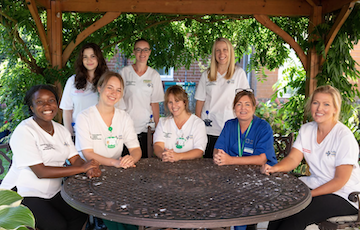Macmillan-funded animation film being used in Welsh hospitals to help cancer patients spot symptoms
A new animation funded by Macmillan Wales is already being screened in some Welsh hospitals to help people affected by cancer spot the signs and symptoms of Metastatic Spinal Cord Compression (MSCC).
The seven-minute long animation is available in English and Welsh to use on television screens to help patients understand MSCC and recognise when they need to take action.
Spinal cord compression happens when cancer cells grow in or near the spine and press on the spinal cord and nerves.
Any type of cancer can spread to the bones of the spine, which may lead to spinal cord compression. It is more common in certain cancers, including breast, lung, prostate and patients who have myeloma or lymphoma and affects 1 in 10 cancer patients.
The South Wales Cancer Network had funding support from Macmillan for a two-year MSCC project and the animation for people affected by cancer has been one of the results of that work.
The animation is already being shown on patient information screens in Velindre Cancer Centre and Cwm Taf University Health Board hospitals.
Susan Morris, Head of Services for Macmillan Cancer Support in Wales, said: “We know that around 10 percent of cancer patients in Wales go on to develop Metastatic Spinal Cord Compression.
“Developing MSCC is regarded as a medical emergency and early identification and treatment often improves the outcome for affected patients.
“The video is not intended to alarm people affected by cancer but to help them recognise the important signs and symptoms. Investigations need to be done as early as possible, as this results in more timely treatment, with better outcomes.
“The animation is available from Macmillan and we hope that it is eventually shown across Wales in all healthcare settings to help cancer patients understand MSCC and recognise when they need to take action.”
Case Study
Kate Bond’s mother Gillian Mackian had breast cancer when Kate was three-years old and was treated for this. Fifteen years later Gillian developed a back problem and it was found she had bone cancer as a result of her breast cancer.
But it was only when her back condition condition worsened and she could not move her legs that an MRI scan showed that 57-year-old Gillian had MSCC.
“It makes you think that if mum’s MSCC had been spotted earlier her last few months might have been better quality for her,” Kate explained.
“Instead of having to be in hospital, if she had been able to walk, mum might have been able to have spent quality time with her family and perhaps gone on holiday with us all.
“We hope the animation really helps others pick-up the symptoms of MSCC early enough to avoid the worst consequences.”
Macmillan MSCC Service Improvement Lead for the South Wales Cancer Network Kate Baker said: “The incidence of MSCC is increasing as people are living longer with cancer.
“This animation is an invaluable resource to raise awareness to patients, relatives and health care professionals alike.
“We hope this resource will be used in a variety of settings, including hospitals, GP clinics and the internet.”
The animation is also available on You Tube in English and Welsh.
English: https://youtu.be/YczxsB7UmAA
Cymraeg: https://youtu.be/KZYgenXk92g
No one should face cancer alone. Call us free on 0808 808 00 00 (Monday to Friday, 9am–8pm) or visit macmillan.org.uk.
Macmillan can only fund services such as this one thanks to the generosity of the public.
To find out more about how you can support Macmillan, call 0300 1000 200 or visit www.macmillan.org.uk/


